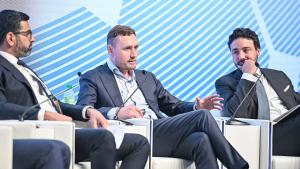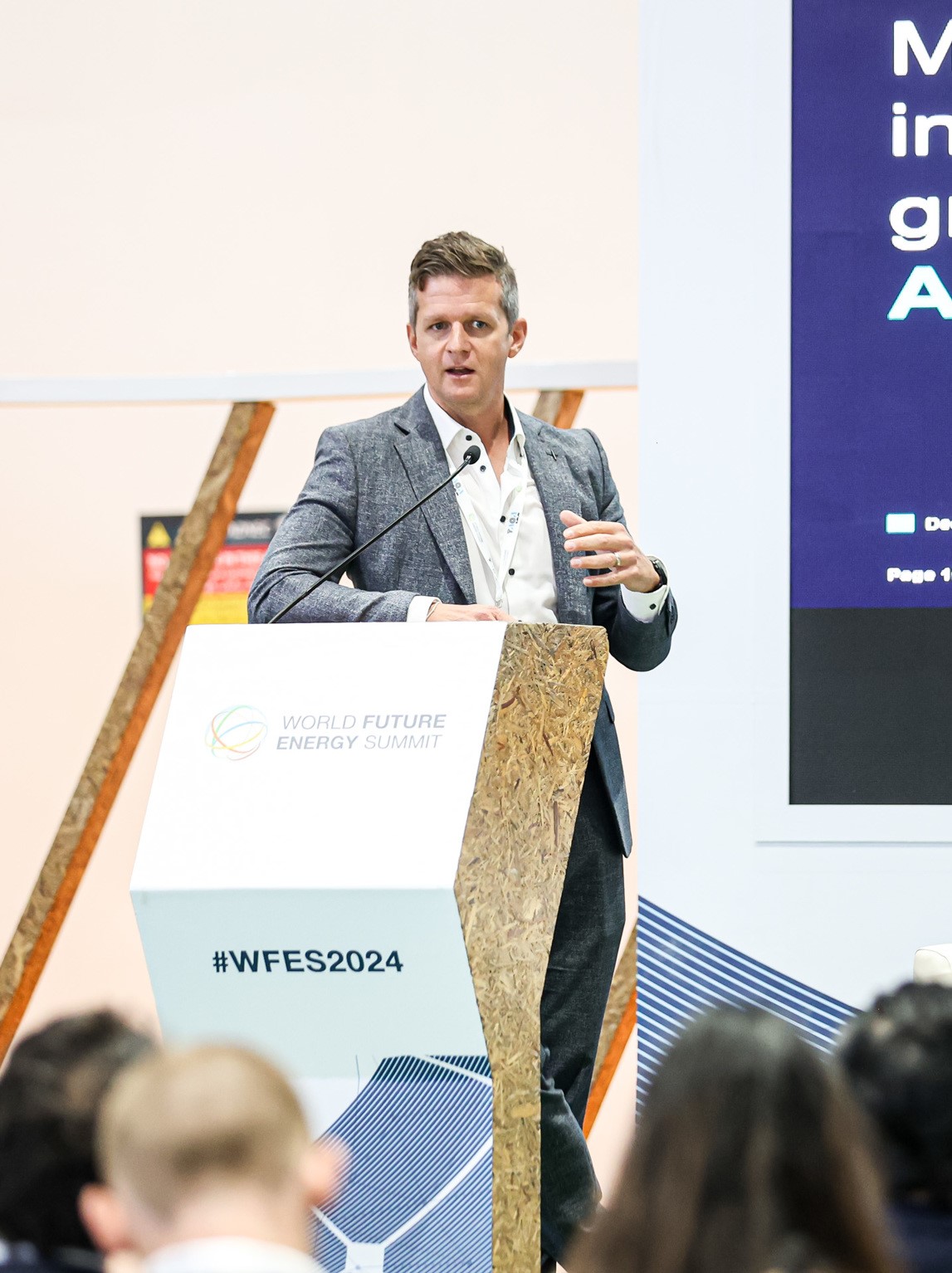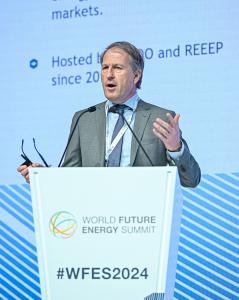Time to Treat Climate Change as ‘Enemy No1’ as Focus Shifts to Green Financing at World Future Energy Summit
ABU DHABI, ABU DHABI, UNITED ARAB EMIRATES, April 18, 2024 /EINPresswire.com/ -- If the world is going to correct its climate change course, the time to rip up the rulebook has arrived, according to Bruce Johnson, Director of Corporate Finance and Treasury at Masdar, the host of the World Future Energy Summit, which runs at Abu Dhabi National Exhibition Centre (ADNEC) until Thursday 18 April.
With the 16th edition of the event’s second day focusing predominantly on Green Financing, Johnson delivered his provocative perspective during a frank discussion on the hurdles facing renewable energy investment and development in a panel entitled “Financing Global Approaches to Low Carbon Economies”.
Masdar, the Abu Dhabi Government-owned company that invests in and develops renewable energy projects globally, has operations in almost all regions of the world. Obstacles, bureaucracy, and red tape means patience is essential, but Johnson was quick to stress that time is running out.
“If we as a planet want to prevent the average temperature from exceeding 1.5°C, I feel like we have to take lots of the paradigms of the social constructs we’ve become used to and throw them in the bin,” Johnson said. “If you realistically want to fix the problem, you have to throw every single dollar you can at fixing the issue. If you look at what governments around the world are spending today, just on defending themselves from other governments, it’s in the trillions. But we’re not spending that kind of money on fighting what I think is probably enemy number one: climate change.
“I feel we need a militaristic approach in terms of funding, but we also need to take a militaristic approach in terms of practicalities. We need to have almost an assembly line of cookie-cutter renewable energy projects, so we can get things done as quickly as possible. We have to sweep all of these things that we ordinarily think about to one side, otherwise, we’ll still be talking about this in 10 years’ time and we will not have fixed the problem.”
Joining Johnson on the panel was Ahmed Y Bahei-Eldin, Managing Director and Commercial Leader - EMEA at GE Vernova, an independent public company spun-off from General Electric and focused on power, wind, and electrification. Agreeing with his Masdar counterpart, Bahei-Eldin added: “Timeframe matters. It’s a slow-moving train wreck that doesn’t seem to elicit any sense of urgency. There’s plenty of capital out there looking for projects – certainly in developed markets – in the areas of renewables and new technologies. Fixing the regulation and structuring the revenue model will open this up for growth.”
Later in the day, Marko van Waveren Hogervorst from the United Nations Industrial Development Organisation (UNIDO), the event’s Insights Supporter, provided an overview of a new private equity fund focusing on early stage, high-impact investments in Pakistan. As the Private Funding Advisory Network (PFAN) Programme Manager at the Division of Decarbonisation and Sustainable Energy at UNIDO’s Climate Technologies Innovation Unit, van Waveren Hogervorst said the investment objective aligns with the dual purpose of achieving financial success while delivering positive impact on the environment and society within the spectrum of low carbon projects.
“PFAN is a global operation set up to bring together groups looking for money that are unable to find it, and those with money looking for bankable small-scale investment projects,” he said. “We’re trying to close that gap by offering capacity building to the entrepreneurs and small businesses, to help them with their business models and financial structure, and ultimately to facilitate investments into these companies.”
Wednesday also saw the official launch of the 2024 Middle East Solar Industry Association (MESIA) Solar Outlook Report. Amid a surge in industrialisation, persistent population growth, and economic development – coupled with the ever-pressing concerns over climate change and environmental sustainability – the report highlighted the growing contribution of solar in the MENA region’s ongoing energy transition journey from traditional fossil fuels to renewables.
According to the report, MENA now boasts one of the world’s highest levels of solar energy potential, with countries such as Saudi Arabia, the UAE, Morocco, and Egypt contributing to average annual solar irradiance exceeding 2,000 kWh per square metre per year. The same nations also helped ensure the region’s solar capacity increased by 23 per cent year-on-year in 2023. But while solar power’s regional growth trajectory is expected to continue, the report reveals it still falls significantly short of the necessary levels required to replace the current 87 per cent contribution of fossil fuels across MENA’s current power generation mix. For now, solar provides only a little more than two per cent.
“The Global Renewables and Energy Efficiency pledge signed at COP28, which is now supported by 124 countries, outlined ambitious targets for increasing renewable energy deployment and energy efficiency measures by 2030,” said Denisa Fainis, Secretary General of MESIA. “However, amid these aspirations lies the challenge of achieving such targets, particularly in the distributed energy sector within the Gulf region.
“The pressure to meet ambitious targets by 2030 places a strong emphasis on utility-scale projects, potentially overshadowing the needs of the commercial and industrial sectors. This underscores the importance of considering a balanced approach to energy deployment to ensure inclusive and sustainable development.”
Meanwhile, speaking at the Solar & Clean Energy Conference, Dr Ralf Blumenthal, Head of Grid Software Middle East & Africa at Siemens, agreed with ongoing discussions around digitalisation and the critical importance of integrating renewables into smart grids to help meet the pledge targets.
“If we are to triple renewables by 2030, and increase nine-fold by 2050, we need batteries,” he said. “And not purely for storage, we need them to regulate the grid and balance the intermittency that we see from renewable generation. Everybody is talking about and investing in renewables, but we must solve inherent challenges for system operators.
“Currently, around 1,500 gigawatts of renewable energy globally are installed and ready to be dispatched, but it cannot be integrated into grids. As far as I am aware, only a handful of smaller grids globally run 100 per cent on renewable energy. At large scale, it’s coming – it has to – but it means we fundamentally need to rethink how we operate these grids given we are so far behind reaching our targets.”
This in-depth analysis of global energy issues and solutions will continue tomorrow with the inaugural eMobility Forum, which will comprehensively examine how clean and autonomous transport will change city design, and what is needed to unlock investment potential for scaling up electric mobility.
As the UAE returns to normal following the country’s extreme weather earlier this week, the third and final day of the World Future Energy Summit has been extended from 9 am – 6 pm to cater for larger than expected volumes of visitors.
For more information on the World Future Energy Summit and how to get involved, visit: https://www.worldfutureenergysummit.com.
With the 16th edition of the event’s second day focusing predominantly on Green Financing, Johnson delivered his provocative perspective during a frank discussion on the hurdles facing renewable energy investment and development in a panel entitled “Financing Global Approaches to Low Carbon Economies”.
Masdar, the Abu Dhabi Government-owned company that invests in and develops renewable energy projects globally, has operations in almost all regions of the world. Obstacles, bureaucracy, and red tape means patience is essential, but Johnson was quick to stress that time is running out.
“If we as a planet want to prevent the average temperature from exceeding 1.5°C, I feel like we have to take lots of the paradigms of the social constructs we’ve become used to and throw them in the bin,” Johnson said. “If you realistically want to fix the problem, you have to throw every single dollar you can at fixing the issue. If you look at what governments around the world are spending today, just on defending themselves from other governments, it’s in the trillions. But we’re not spending that kind of money on fighting what I think is probably enemy number one: climate change.
“I feel we need a militaristic approach in terms of funding, but we also need to take a militaristic approach in terms of practicalities. We need to have almost an assembly line of cookie-cutter renewable energy projects, so we can get things done as quickly as possible. We have to sweep all of these things that we ordinarily think about to one side, otherwise, we’ll still be talking about this in 10 years’ time and we will not have fixed the problem.”
Joining Johnson on the panel was Ahmed Y Bahei-Eldin, Managing Director and Commercial Leader - EMEA at GE Vernova, an independent public company spun-off from General Electric and focused on power, wind, and electrification. Agreeing with his Masdar counterpart, Bahei-Eldin added: “Timeframe matters. It’s a slow-moving train wreck that doesn’t seem to elicit any sense of urgency. There’s plenty of capital out there looking for projects – certainly in developed markets – in the areas of renewables and new technologies. Fixing the regulation and structuring the revenue model will open this up for growth.”
Later in the day, Marko van Waveren Hogervorst from the United Nations Industrial Development Organisation (UNIDO), the event’s Insights Supporter, provided an overview of a new private equity fund focusing on early stage, high-impact investments in Pakistan. As the Private Funding Advisory Network (PFAN) Programme Manager at the Division of Decarbonisation and Sustainable Energy at UNIDO’s Climate Technologies Innovation Unit, van Waveren Hogervorst said the investment objective aligns with the dual purpose of achieving financial success while delivering positive impact on the environment and society within the spectrum of low carbon projects.
“PFAN is a global operation set up to bring together groups looking for money that are unable to find it, and those with money looking for bankable small-scale investment projects,” he said. “We’re trying to close that gap by offering capacity building to the entrepreneurs and small businesses, to help them with their business models and financial structure, and ultimately to facilitate investments into these companies.”
Wednesday also saw the official launch of the 2024 Middle East Solar Industry Association (MESIA) Solar Outlook Report. Amid a surge in industrialisation, persistent population growth, and economic development – coupled with the ever-pressing concerns over climate change and environmental sustainability – the report highlighted the growing contribution of solar in the MENA region’s ongoing energy transition journey from traditional fossil fuels to renewables.
According to the report, MENA now boasts one of the world’s highest levels of solar energy potential, with countries such as Saudi Arabia, the UAE, Morocco, and Egypt contributing to average annual solar irradiance exceeding 2,000 kWh per square metre per year. The same nations also helped ensure the region’s solar capacity increased by 23 per cent year-on-year in 2023. But while solar power’s regional growth trajectory is expected to continue, the report reveals it still falls significantly short of the necessary levels required to replace the current 87 per cent contribution of fossil fuels across MENA’s current power generation mix. For now, solar provides only a little more than two per cent.
“The Global Renewables and Energy Efficiency pledge signed at COP28, which is now supported by 124 countries, outlined ambitious targets for increasing renewable energy deployment and energy efficiency measures by 2030,” said Denisa Fainis, Secretary General of MESIA. “However, amid these aspirations lies the challenge of achieving such targets, particularly in the distributed energy sector within the Gulf region.
“The pressure to meet ambitious targets by 2030 places a strong emphasis on utility-scale projects, potentially overshadowing the needs of the commercial and industrial sectors. This underscores the importance of considering a balanced approach to energy deployment to ensure inclusive and sustainable development.”
Meanwhile, speaking at the Solar & Clean Energy Conference, Dr Ralf Blumenthal, Head of Grid Software Middle East & Africa at Siemens, agreed with ongoing discussions around digitalisation and the critical importance of integrating renewables into smart grids to help meet the pledge targets.
“If we are to triple renewables by 2030, and increase nine-fold by 2050, we need batteries,” he said. “And not purely for storage, we need them to regulate the grid and balance the intermittency that we see from renewable generation. Everybody is talking about and investing in renewables, but we must solve inherent challenges for system operators.
“Currently, around 1,500 gigawatts of renewable energy globally are installed and ready to be dispatched, but it cannot be integrated into grids. As far as I am aware, only a handful of smaller grids globally run 100 per cent on renewable energy. At large scale, it’s coming – it has to – but it means we fundamentally need to rethink how we operate these grids given we are so far behind reaching our targets.”
This in-depth analysis of global energy issues and solutions will continue tomorrow with the inaugural eMobility Forum, which will comprehensively examine how clean and autonomous transport will change city design, and what is needed to unlock investment potential for scaling up electric mobility.
As the UAE returns to normal following the country’s extreme weather earlier this week, the third and final day of the World Future Energy Summit has been extended from 9 am – 6 pm to cater for larger than expected volumes of visitors.
For more information on the World Future Energy Summit and how to get involved, visit: https://www.worldfutureenergysummit.com.
Pragati Malik
MCS Action FZ LLC
71545315575
email us here
Visit us on social media:
Other
Legal Disclaimer:
EIN Presswire provides this news content "as is" without warranty of any kind. We do not accept any responsibility or liability for the accuracy, content, images, videos, licenses, completeness, legality, or reliability of the information contained in this article. If you have any complaints or copyright issues related to this article, kindly contact the author above.



